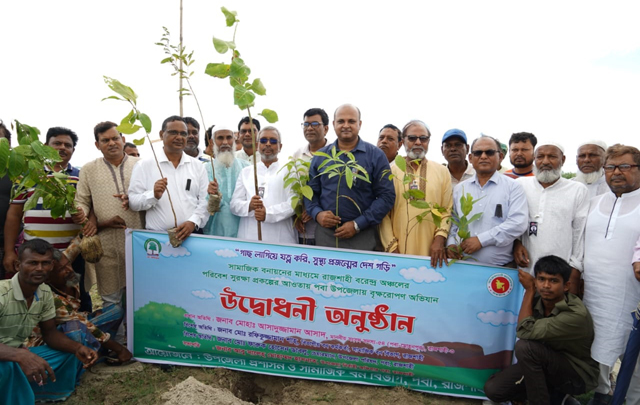
By Md Aynal Haque
RAJSHAHI, August 2, 2024 (BSS) - Social forestation has benefited scores of
people, including women most of whom are marginalised in the region, as well
as its char (river shoals) and Barind tract, providing dividends of their
legitimate share for looking after trees.
Besides, the participatory social afforestation programme has improved the
living and livelihood conditions of the beneficiary poor and landless farmers
by increasing their income to some extent as they get profit share after
being sold trees following 10 years of plantation.
More than 50,000 tree saplings of forest, fruit and medicinal plants have so
far been transplanted in Char Mazar Diar village under Paba upazila creating
a scenic beauty along with eco-friendly atmospheres everywhere in the
afforested area.
The Department of Social Forestry (DSF) has transplanted the trees under its
five-year project titled "Environment Protection through Social Forestry in
the Rajshahi Barind Tract Region" during the last couple of years.
Another 10,000 tree saplings will also be transplanted in five seedling-
kilometer areas of the village during the current season.
Muhammad Asaduzzaman, MP, inaugurated the tree plantation drive at the
village on Thursday afternoon as the chief guest saying adequate tree
plantation can be the crucial means of reducing carbon emission together with
mitigating the adverse impact of climate change.
Among others, Upazila Chairman Faruque Hossain, Upazila Nirbahi Officer (UNO)
Abu Saleh Muhammad Hasnat, Divisional Forest Officer Rafiquzzaman Shah and
Assistant Conservator of Forest Mehedi-Uz-Jaman were present on the occasion.
Abul Hossain, president of the Char Mazar Diar Social Forestry Committee,
said seven volunteers are currently working to guard the forest. He himself
spends most of his time inside the forest, he added.
It feels utterly insecure at night to stay inside such a vast forest that
takes 4.5 hours to travel on foot. There is a need to set up several solar
panels at the forest guard's cottage so that they can get light there.
Hossain said the profitable afforestation activities encouraged many people
to plant saplings of wood, medicinal and fruit-bearing trees at homesteads,
roadsides, office premises, embankments, forest areas, religious
institutions' premises and other places.
Divisional Forest Officer Rafiquzzaman Shah told BSS that the project is
being implemented in 32 upazilas of Rajshahi, Naogaon, Chapainawabganj and
Natore districts since November, 2020 last.
Main thrust of the Taka 35.13-crore project is to conserve and improve
biodiversity in Rajshahi barind area through social afforestation. It also
has provision of improving the eco-friendly natural tourist spot of Altadighi
National Park at Dhamoirhat upazila in Naogaon district.
Various other infrastructures, including establishing observation tower,
seating bench, road, parking area, concrete guide map, footpath, toilet and
water supply are being constructed centering the park.
It also has a provision of distributing around six lakh saplings of fruit,
forest and herbal trees among poor community people for transplantation free
of cost so that they can meet their demands of nutrition and fuel.
Shah said they will generate 600-kilometer strip forest on a participatory
basis, 100-hectare woodlot garden and 50-hectare garden with saplings of
endangered and long-life tree species during the project period until June
2025.
They will also transplant 40,000 saplings of domestic and ornamental plant
species-- three lakh palm trees, 5,000 wood-plants, he said.
Role of the palm tree is very important to reduce the rate of lightning that
claims the lives of both people and domestic animals every year.
Herbal orchard will be generated with around 1,250 saplings of medicinal
plants, Shah said.
Enrichment plantation will be made on 20 hectares of land for development of
natural Shal forest along with establishing two arboretums with extinct
species of trees and generation of herbal orchards with medicinal plants, he
said.
Footpaths and other essential infrastructures along with seating arrangements
will be constructed on the embankments and adjacent areas of Sonadighi and
Dibor Dighi to make those attractive to the visitors and tourists.
On behalf of the project, beneficiary and community people will be imparted
training on orchard creation and its management, environment conservation,
adverse impact of climate change along with its adaptation and mitigation,
eco-friendly eco-tourism management and wildlife conservation.
As a whole, the social forestry project has been providing assistance to
around 4,500 people for their capacity building and making them adapt to
climate change along with biodiversity protection in the region, including
its vast Barind tract for the last couple of years.
Besides, around 3,500 households of ethnic minorities and other less-income
groups are making earnings through participation in forestry activities and
different income-generating ventures.